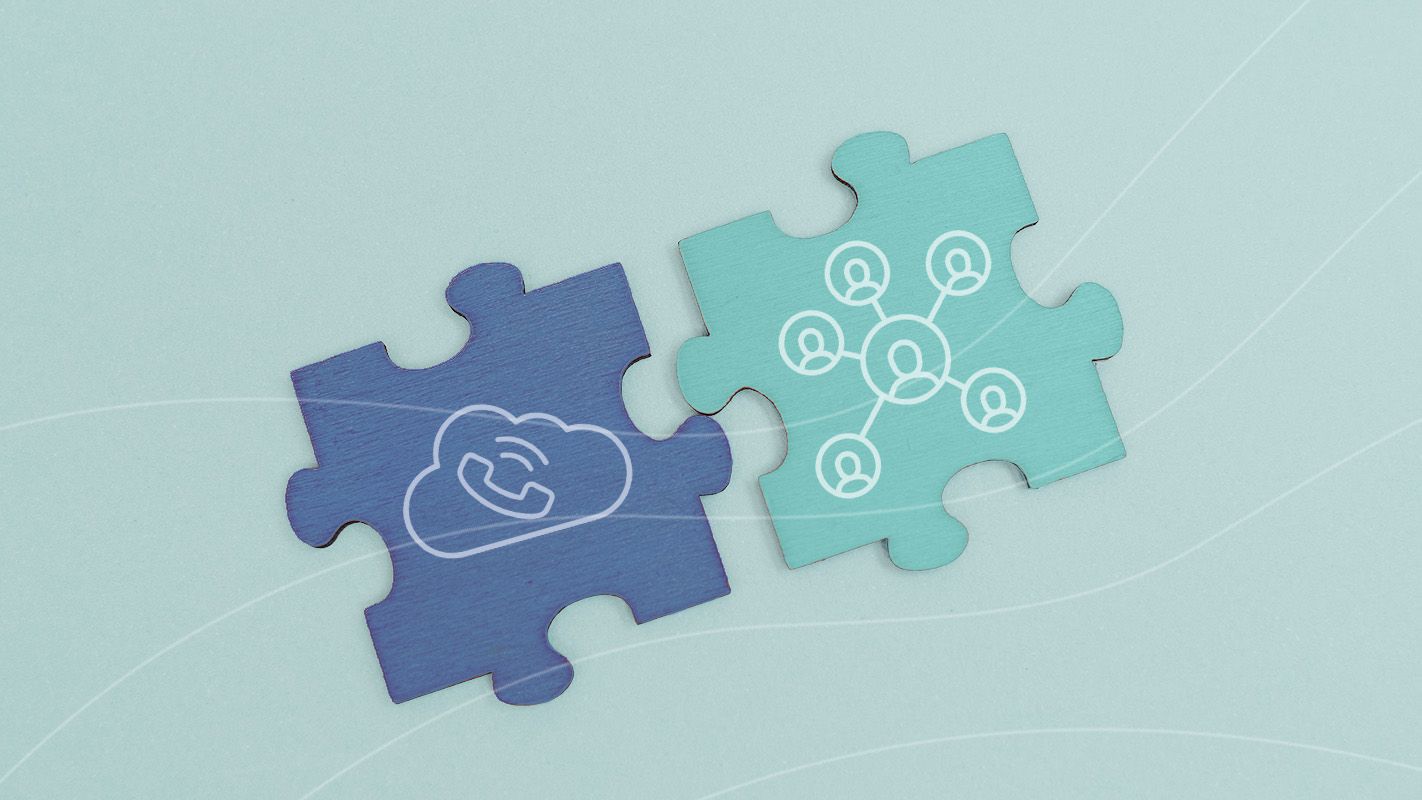In any modern business, seamless communications are essential. A cloud PBX manages how voice interactions flow - from IVRs and call queues to internal collaboration and external customer communications. This service ensures that every call reaches the right person, maintaining efficiency, clarity and consistency across the organization. A customer relationship management system (CRM), meanwhile, is designed to organize customer information, manage sales pipelines, track support requests, and provide valuable business insights through email, chat, and data analysis.
Together, these systems complement each other perfectly. Integrating a cloud PBX with your CRM creates a unified environment where communications and customer data work hand in hand - helping teams stay connected, informed, and ready to deliver exceptional service.
What is a cloud PBX?
A cloud PBX is a cloud-based phone solution that allows businesses to make, receive, and manage calls over the internet. Key benefits include:
- Scalability to grow with your business
- Flexibility for remote and hybrid teams
- Advanced features like voicemail-to-email, call forwarding, and analytics
What is a CRM?
A CRM system centralizes customer data such as contact details, communication history, sales opportunities, and support tickets. Popular options include Salesforce, HubSpot, and Zoho. CRMs help businesses to:
- Organize customer information efficiently
- Gain insights into sales pipelines and customer journeys
- Deliver personalized customer service
Why integrate a cloud PBX with CRM?
Integrating your cloud PBX with a CRM platform connects two essential business systems - your communication infrastructure and your customer management tools. This type of integration enables call data, contact information, and communication histories to flow seamlessly between both platforms. Instead of operating as separate systems, your cloud PBX and CRM work together to provide a complete view and history of every customer interaction.
Increased efficiency: Integrating a CRM system with a cloud PBX can significantly enhance team productivity. For instance, 50% of businesses reported improved agent productivity through CRM integration, as this powerful combination streamlines workflows and reduces manual tasks.
Unified customer information: Calls are automatically logged in the CRM, giving your team access to the complete customer history before every conversation.
Improved sales and support performance: With cloud PBX and CRM integration, every call is linked to customer data, giving teams an instant context for faster, more personalized responses, thereby building stronger customer relationships. As a result, CRM integration has been shown to boost sales productivity by up to 34%, and sales forecast accuracy by 42%.
Actionable insights: This integration combines call data with CRM analytics, helping businesses to track trends, monitor performance, and make informed decisions.
Remote team flexibility: A cloud PBX combined with a dedicated softphone app allows teams to stay connected from anywhere. When integrated with a CRM, users can access customer contact details, call history, and notes directly from the app, improving remote productivity.
AI transcription: AI-powered call transcription for a cloud PBX transforms conversations into actionable insights by capturing key topics and instantly delivering summaries. This service analyzes talk-to-listen ratios to improve communication effectiveness and overall agent performance. With built-in sentiment analysis, businesses can gauge customer satisfaction and enhance every interaction.
How a cloud PBX connects with CRM
A cloud PBX integrates with your CRM by linking calls to customer records. Calls are automatically logged, customer information appears during calls for faster, more personalized service, and click-to-call features streamline communications. Analytics provide insights into customer engagement performance, and most platforms support expansion through built-in or third-party connectors.
Connecting a cloud PBX to CRM: steps for effective integration
Choose compatible platforms: Ensure that your cloud PBX and CRM both support integration, either via native connectors, APIs, or third-party middleware.
Define integration goals: Decide what you want to achieve - for example, automatic call logging, click-to-call, real-time notifications, and advanced analytics and monitoring.
Map data flows: Identify which data points need to sync between systems - whether it is contacts, call history, notes, or tasks.
Test before launch: Run pilot tests to ensure that data syncs correctly, notifications trigger as expected, and workflows are smooth.
Train your team: Integrate smoothly by educating users on new features and providing documentation to ensure full adoption and long-term success.
Conclusion
Integrating your cloud PBX with your CRM is more than just a technical upgrade - it’s a way to make your business smarter, more efficient, and truly customer-focused. By combining call management with customer data, your teams can save time, gain actionable insights, and deliver better customer experiences.
DIDWW offers phone.systems™ Cloud PBX solution, designed to streamline business communications. The platform provides AI-powered phone systems, transcripts, and advanced call routing. In addition, seamless CRM integrations with phone.systems™ automate customer communications by synchronizing contact details, logging calls, and storing call data. DIDWW currently supports leading CRMs including HubSpot, Zendesk, monday.com, Zoho, Salesforce, and Pipedrive, with continuous expansion to additional platforms to meet evolving business needs. The intuitive, user-friendly phone.systems™ interface requires no training or expertise, allowing users to effortlessly combine our PBX and voice services with phone numbers in 90+ countries.
